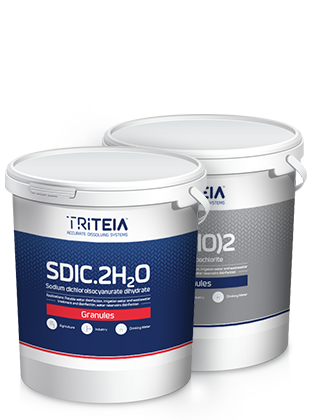
Higher Concentration & Stability

Save Investments & Operation Costs

Safe with Minimal Enviromental Impact
Chlorination is an essential part of water treatment in a wide variety of applications and is commonly done with sodium hypochlorite solution.
Sodium hypochlorite solution is usually available worldwide except in remote areas as due to its unique properties, it has to be used in relative proximity to the area of its production. While its use is considered to be relatively simple, the handling of sodium hypochlorite solution poses substantial challenges some of which are similar to when using other corrosive and hazardous liquid chemicals and others resulting from the unique properties of liquid sodium hypochlorite.
Sodium hypochlorite solution is only available in very low concentrations (maximum 10-12%) of active chlorine or Free Available Chlorine (FAC). Moreover, soon after its production, the concentration of FAC in sodium hypochlorite solution starts to degrade rapidly, especially in warm environment conditions.
Low chemical concentration and fast FAC concentration degradation require large storage and transportation volumes
These two specific properties of sodium hypochlorite solution means that large onsite storage is required, frequent transportation of the chemical to the site is necessary, and the refilling or replacing and discarding of used chemical storage tanks is complex.
Moreover, the sodium hypochlorite production plants are often relatively far from the water treatment sites; and in many cases, this hazardous chemical is transported through or stored in the proximity of populated areas.
In addition to substantial economic impact, the fast degradation of the FAC in sodium hypochlorite solution also has quality implications related to the formation of undesirable by-products such as Chlorate (ClO), which is regulated in some countries due to its harmful affect on the environment.
Low stability of liquid hypochlorite solution means high level of manual intervention by chlorination plant operators
The FAC degradation in liquid sodium hypochlorite solution affects plant operations as it requires a higher sodium hypochlorite dosage to achieve the desired disinfection power. As a result, plant operators have to frequently change and manage their chlorination system settings.
The instability of liquid sodium hypochlorite and more specifically, the rapid and uncontrollable ratio change between the FAC and chlorate concentrations, even affects the residual chlorine reading in the most commonly used online residual chlorine measurement systems.
However, in many water treatment plants, there are no methodical procedures for solving the problems that arise due to the instability of liquid hypochlorite. For this reason, the chlorination process is often inefficient and inaccurate – in terms of both economic and quality aspects.
The use of granular chlorine as an alternative to liquid sodium hypochlorite is on the rise
Granular chlorine is widely available and formally accepted by public health regulators worldwide for chlorination processes such as drinking water disinfection or for swimming pool chlorination.
The main advantages of dry granular (solid) chlorine over liquid sodium hypochlorite solution are:
- Its FAC concentration is 5 to 7 times higher than in liquid sodium hypochlorite solution. For example, granular calcium hypochlorite is commonly available with 65% or 70% chlorine concentration and granular sodium dichloro isocyanurate with 55-56% FAC concentration.
- The FAC concentration in granular chlorine remains stable over long storage periods.
- The handling during transportation and storage of granular chlorine is much easier, cleaner and safer than the handling of liquid chemicals.
All of these advantages ensure substantially lower transportation and storage handling costs due to smaller volumes, and cleaner and more efficient storage and operations – all resulting in significantly lower environmental and safety risks.
Triteia advanced dissolving systems offer an accurate, safe and affordable solution for chlorination with granular chlorine
In order to efficiently use granular chlorine for chlorination processes, it needs to be dissolved onsite into a chemical solution that can be reliably, accurately and safely injected into the process. This requires a highly-accurate system that is automatic yet controllable, as well as simple to operate.
Triteia, a pioneer in this field, offers a series of accurate granular chlorine dissolving systems. These systems are comprehensive and affordable, and can be used with multiple types of granular chlorine, as well as for any chlorination application or capacity.
Triteia Systems are based on an innovative and unique Dosing Feeder, which is designed to feed the chlorine granules into the system in an accurate and controlled way. The accuracy and controllability of the feeder operations ensures a high level of process quality, reduced manual operations and maintenance and the most efficient chemical consumption.
